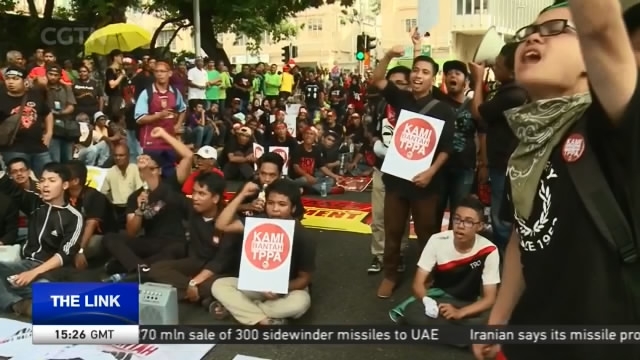
08:39, 09-Mar-2018
ASEAN and the TPP: Four ASEAN countries join the deal, others also keen

Four Southeast Asian countries have signed on to the revised Trans-Pacific Partnership trade deal -- Singapore, Vietnam, Malaysia, and Brunei. Others may soon follow.
But as Rian Maelzer reports from Malaysia, some economists are raising concerns about the deal.
Protestors opposing the original Trans-Pacific Partnership came from Malaysia's left and right. Right-wing nationalists worried about the threat to affirmative action policies that favor the majority ethnic Malays.
Left-wing activists worried the deal would restrict access to cheaper generic medicines. They still do, despite some intellectual property provisions being put on hold in the new CPTPP.
EDWARD LOW POSITIVE MALAYSIAN TREATMENT ACCESS GROUP "The 22 provisions are suspended but are still in the book. The concern still remains, so we do not still give up on our struggle to advocate our rights to health."
Malaysia's government had a tougher time selling the original TPP to its people than the other ASEAN countries did. Economists believe they were right to keep pursuing the deal despite the US's withdrawal.
PROFESSOR YEAH KIM LENG ECONOMIST, SUNWAY UNIVERSITY "It will be a very good, positive signal to globalization as well as important to ensure free trade in the global economy, and also, importantly, to sustain the current global growth momentum."
Three of the four ASEAN CPTPP signatories – Malaysia, Singapore, and Vietnam -- are heavily dependent on exports. Brunei is the fourth ASEAN CPTPP signatory. Three others -- the Philippines, Indonesia, and Thailand – are in line to join.
PROFESSOR YEAH KIM LENG ECONOMIST, SUNWAY UNIVERSITY "We think that is still beneficial for these export-dependent economies. It's an opportunity for them to improve their standards of trade as well as economic governance in the country relating to labor rights as well as other important conditions that are not part of the conventional trade agreements."
RIAN MAELZER KUALA LUMPUR "After signing the original Trans-Pacific Partnership, Malaysia already set about amending some laws and regulations to comply with the deal. So it has already laid the groundwork to allow for smooth and speedy ratification of the new CPTPP. RM CGTN KL."

SITEMAP
Copyright © 2018 CGTN. Beijing ICP prepared NO.16065310-3
Copyright © 2018 CGTN. Beijing ICP prepared NO.16065310-3